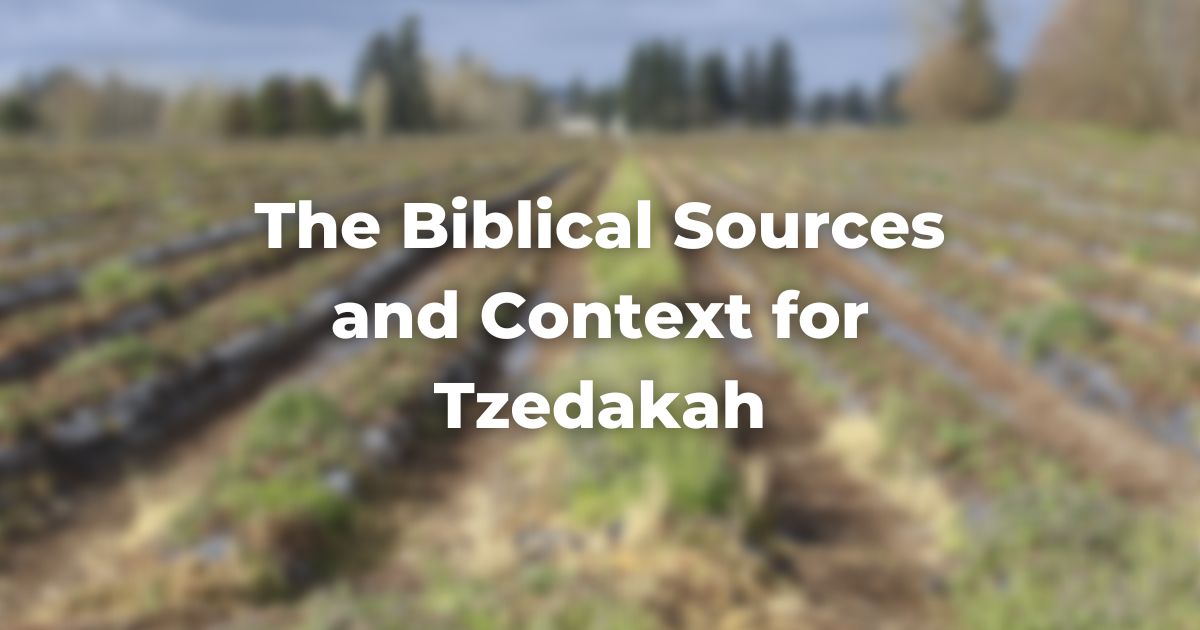The TorahRefers to the first five books of the Hebrew Bible, the Tanakh, also called the Five Books of Moses, Pentateuch or the Hebrew equivalent, Humash. This is also called the Written Torah. The term may also refer to teachings that expound on Jewish tradition. Read more provides many examples and legal provisions which are the foundation of our understanding of tzedakah.
The Torah, presuming a primarily agricultural economy, specifies a number of gifts to the poor that a landowner must provide:
- leaving for the poor the corners of the fields (peah, as described at Leviticus 19:9 and Leviticus 23:22)
- sheaves or fruit forgotten while harvesting (shikh’ḥah, as described at Deuteronomy 24:19)
- the stalks that by chance fall aside from the edge of the farmer’s sickle (leket, as described at Leviticus 19:9 and Leviticus 23:22 and illustrated in the Book of Ruth)
- grapes separated from their clusters (peret, as described at Leviticus 19:10)
- and defective clusters of grapes or olives (ol’lot, as described at Deuteronomy 24:21–22).
- During the sabbatical year, when fields lay fallow, the poor had first rights to the sabbatical produce (Exodus 23:11, but see Leviticus 25:6–7, where it is the owners of land together with their slaves and hired workers who are entitled to it).
In addition, during the third and sixth years of the sabbatical cycle, a tithe of all of one’s crops was to be designated for the poor (maaser ani, the tithe of the poor, as mentioned at Deuteronomy 14:28–29 and Deuteronomy 26:12–13). The First Tithe (maaser rishon), given yearly to the Levites, was also a form of aid to the poor, for the Levites had no other income. Levites, biblically, did not own any land and were sustained through the tithes.
Finally, the Torah provides that every fifty years, during the jubilee year, all land reverts to its original owners; this was intended to prevent permanent impoverishment (Leviticus 25:8 ff.).
Several other provisions of biblical law helped to prevent poverty. Workers were to be paid promptly (Leviticus 19:13 and Deuteronomy 24:14–15), and those who had money were commanded to extend loans to their fellow Israelites in need without interest (Exodus 22:24, Leviticus 25:36–37, and Deuteronomy 23:20).
During the sabbatical year, debts were to be canceled altogether, but Israelites were nevertheless forbidden to “harbor the base thought” of refusing to loan money to needy Israelites merely because the onset of the sabbatical year was near (Deuteronomy 15:1–2, 7–11).
If clothing had been taken as a pledge for a loan, it was to be returned for use by the poor person at night (Exodus 22:25–26). Furthermore, when collecting such a pledge, the creditor had to stand outside the poor person’s home (to avoid invading his or her space), thus reinforcing the abiding dignity of the poor person despite his or her poverty (Deuteronomy 24:10–15).
Also, it was the duty of the judge to protect the rights of the downtrodden (Exodus 23:6–9; see also Deuteronomy 16:18–20 and Deuteronomy 23:17–18, and Psalm 82:3).
Comparison to Other Contemporaneous Societies
No other ancient law code makes ongoing provisions for the poor based on each year’s crops, as the Torah does.
The closest is in the Egyptian work called “The Instruction of Amen-em-Opet,” a letter from sometime between the tenth and the sixth centuries B.C.E., which advises that widows should be permitted to glean unhindered and that gifts of oil should be given to the poor. This is described positively as conduct approved by the gods, but it is clearly not required by them—and certainly not by human governing authorities.
In most law codes prior to modern times, in fact, it was assumed that poor people were not just unfortunate, but that their poverty was caused by some moral fault and therefore they did not deserve to be helped, but instead to be punished.
In England and the United States, for example, debtors’ prisons were common until the nineteenth century, and even though they were theoretically abandoned at that time, imprisonment on other charges, such as concealment of assets, continued the underlying idea that debtors should be imprisoned for their wrongdoing.
These biblical laws, then, which proclaim that the poor are not to be blamed but to be helped, were truly unprecedented and innovative, and they can only be explained on the basis of the Israelites’ theological convictions.
Adapted with permission from The Observant Life.
Authors
-

The Observant Life: The Wisdom of Conservative Judaism for Contemporary Jews distills a century of thoughtful inquiry into the most profound of all Jewish questions: how to suffuse life with timeless values, how to remain loyal to the covenant that binds the Jewish people and the God of Israel, and how to embrace the law while retaining an abiding sense of fidelity to one’s own moral path in life. Written in a multiplicity of voices inspired by a common vision, the authors of The Observant Life explain what it means in the ultimate sense to live a Jewish life, and to live it honestly, morally, and purposefully. The work is a comprehensive guide to life in the 21st Century. Chapters on Jewish rituals including prayer, holiday, life cycle events and Jewish ethics such as citizenship, slander, taxes, wills, the courts, the work place and so much more.
View all posts -









